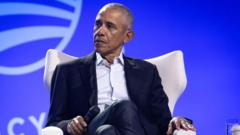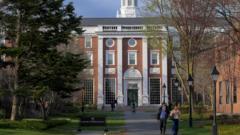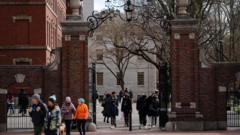Obama's vocal support for Harvard highlights tensions between universities and federal funding policies under Trump.
**Obama Urges Academic Freedom Amid Trump Administration's Funding Freeze on Harvard**

**Obama Urges Academic Freedom Amid Trump Administration's Funding Freeze on Harvard**
Former President Obama criticizes Trump's actions against Harvard, advocating for cherished academic values.
In a rare public critique of the Trump administration, former President Barack Obama has applauded Harvard University for resisting the White House's pressure to alter its policies or risk losing over $2 billion in federal funding. This move, aimed at combating perceived antisemitism on campus, has drawn sharp rebuke from Obama, a Harvard alumnus, who labeled the funding freeze as "unlawful and ham-handed."
"In siding with academic freedom, Harvard has set a powerful precedent for other higher education institutions," Obama stated on social media. His comments mark a significant shift in tone, as he has mostly refrained from criticizing fellow leaders since leaving office nearly a decade ago, choosing instead to honor personal milestones and athletic events in his online presence.
Obama is not alone in voicing support for Harvard’s decision. Amidst a backdrop of increasing pressure from the Trump administration to modify university operations, faculty members at Yale University have actively rallied behind Harvard's stance. "We stand united," remarked a letter from hundreds of Yale faculty, emphasizing that these governmental interventions threaten the foundational principles of democracy, including academic freedom and free expression.
While many universities, reliant on federal research funding, grapple with dwindling resources and hiring freezes, Harvard's defiance stands out. Institutions like Stanford University and Columbia have shown varying responses to the administration's demands, with Columbia accepting changes, indicating the complex balances universities must strike between regulatory compliance and maintaining academic integrity.
In the face of Trump’s threats, which include potential revocation of tax-exempt statuses for universities deemed overly political, Harvard President Alan Garber affirmed, "Governments should steer clear of dictating educational content or institutional direction." MIT has since joined Harvard in rejecting federal directives, signaling a growing resistance among elite academic institutions against perceived government overreach.
Despite the increasing backlash, Trump remains steadfast, issuing additional threats against Harvard, further heightening the stakes in this ongoing national debate over educational autonomy, federal funding, and academic freedom.
"In siding with academic freedom, Harvard has set a powerful precedent for other higher education institutions," Obama stated on social media. His comments mark a significant shift in tone, as he has mostly refrained from criticizing fellow leaders since leaving office nearly a decade ago, choosing instead to honor personal milestones and athletic events in his online presence.
Obama is not alone in voicing support for Harvard’s decision. Amidst a backdrop of increasing pressure from the Trump administration to modify university operations, faculty members at Yale University have actively rallied behind Harvard's stance. "We stand united," remarked a letter from hundreds of Yale faculty, emphasizing that these governmental interventions threaten the foundational principles of democracy, including academic freedom and free expression.
While many universities, reliant on federal research funding, grapple with dwindling resources and hiring freezes, Harvard's defiance stands out. Institutions like Stanford University and Columbia have shown varying responses to the administration's demands, with Columbia accepting changes, indicating the complex balances universities must strike between regulatory compliance and maintaining academic integrity.
In the face of Trump’s threats, which include potential revocation of tax-exempt statuses for universities deemed overly political, Harvard President Alan Garber affirmed, "Governments should steer clear of dictating educational content or institutional direction." MIT has since joined Harvard in rejecting federal directives, signaling a growing resistance among elite academic institutions against perceived government overreach.
Despite the increasing backlash, Trump remains steadfast, issuing additional threats against Harvard, further heightening the stakes in this ongoing national debate over educational autonomy, federal funding, and academic freedom.























